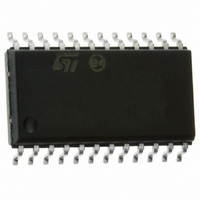L6229D STMicroelectronics, L6229D Datasheet - Page 19

L6229D
Manufacturer Part Number
L6229D
Description
IC MOTOR DRIVER 3PHASE 24-SOIC
Manufacturer
STMicroelectronics
Type
Driverr
Datasheet
1.L6229DTR.pdf
(25 pages)
Specifications of L6229D
Applications
DC Motor Driver, Brushless (BLDC), 3 Phase
Number Of Outputs
1
Current - Output
2.8A
Voltage - Supply
12 V ~ 52 V
Operating Temperature
-40°C ~ 150°C
Mounting Type
Surface Mount
Package / Case
24-SOIC (7.5mm Width)
Operating Temperature Classification
Automotive
Package Type
SO
Operating Supply Voltage (min)
12V
Operating Supply Voltage (max)
52V
Operating Supply Voltage
8 V to 52 V
Supply Current
1.4 A
Mounting Style
SMD/SMT
Motor Type
Three Phase DC Brushless
No. Of Outputs
3
Output Current
3.55A
Output Voltage
52V
Supply Voltage Range
8V To 52V
Driver Case Style
SO
No. Of Pins
24
Rohs Compliant
Yes
For Use With
497-5491 - EVAL BOARD FOR L6229PD SOIC
Lead Free Status / RoHS Status
Lead free / RoHS Compliant
Voltage - Load
-
Lead Free Status / Rohs Status
Compliant
Other names
497-5839-5
L6229D
L6229D
Available stocks
Company
Part Number
Manufacturer
Quantity
Price
Part Number:
L6229D
Manufacturer:
ST
Quantity:
20 000
Company:
Part Number:
L6229DTR
Manufacturer:
STMicroelectronics
Quantity:
1 924
4.1 OUTPUT CURRENT CAPABILITY AND IC POWER DISSIPATION
In Figure 25 is shown the approximate relation between the output current and the IC power dissipation using
PWM current control.
For a given output current the power dissipated by the IC can be easily evaluated, in order to establish which
package should be used and how large must be the on-board copper dissipating area to guarantee a safe op-
erating junction temperature (125°C maximum).
Figure 25. IC Power Dissipation versus Output Power.
4.2 THERMAL MANAGEMENT
In most applications the power dissipation in the IC is the main factor that sets the maximum current that can
be delivered by the device in a safe operating condition. Selecting the appropriate package and heatsinking con-
figuration for the application is required to maintain the IC within the allowed operating temperature range for
the application. Figures 26, 27 and 28 show the Junction-to-Ambient Thermal Resistance values for the
PowerSO36, PowerDIP24 and SO24 packages.
For instance, using a PowerSO package with copper slug soldered on a 1.5mm copper thickness FR4 board
with 6cm
mounting methods for this package. Using a multi-layer board with vias to a ground plane, thermal impedance
can be reduced down to 15°C/W.
Figure 26. PowerSO36 Junction-Ambient thermal resistance versus on-board copper area.
2
dissipating footprint (copper thickness of 35µm), the R
ºC / W
43
38
33
28
23
18
13
P
D
[W]
1
10
2
8
6
4
2
0
3
0
4
0.25 0.5 0.75
5
6
s q . c m
I
OUT
7
W ith o ut G ro u nd La yer
W ith Gro un d La yer
W ith Gro un d La yer+ 16 via
H o le s
8
[A]
9
1
10
1 1
1.25 1.5
1 2
13
Test Condition s:
Supply Voltage = 24 V
I
I
I
1
2
3
th(j-amb)
On-Board Copper Area
No PWM
f
SW
I
= 30 kHz (slow decay)
OUT
is about 35°C/W. Figure 29 shows
I
OUT
I
OUT
L6229
19/25













